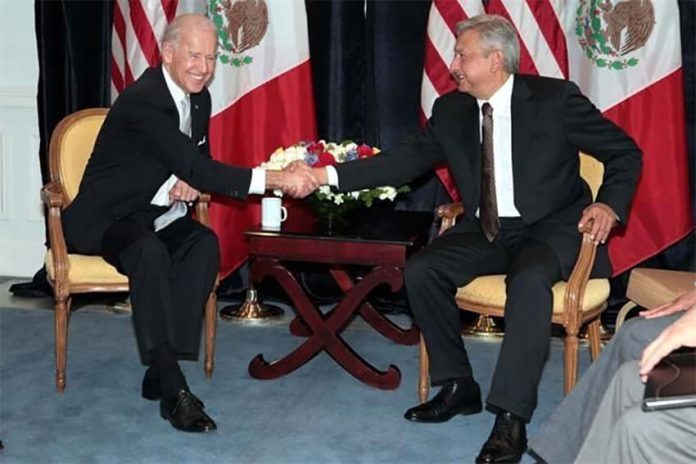Cooperation on development in southern Mexico and Central America was a key focus of President López Obrador’s phone call with United States President Joe Biden on Friday.
López Obrador said he had a “cordial” conversation with his U.S. counterpart, adding in a social media post that they spoke about “issues of interest in the bilateral relationship.”
The president also said they agreed that Foreign Affairs Minister Marcelo Ebrard would travel to Washington, D.C., on Monday to work with U.S. officials on “issues of cooperation for development” and the Summit of the Americas – a meeting of the heads of state of Western Hemisphere countries that will be held in Los Angeles in June.
The approximately 50-minute call came four months after Mexico and the United States entered into a new security agreement that superseded the 13-year-old Mérida initiative and as the U.S. remains concerned about its neighbor’s energy sector policies and plans, albeit less so because López Obrador’s nationalistic electricity bill failed to pass Congress last month.
In a statement, the Mexican president’s office said López Obrador and Biden reviewed progress on bilateral development cooperation in Central American and southern Mexico. Their cooperation is aimed at attending the root causes of migration to the United States, such as poverty, lack of opportunity and insecurity.
Tuvimos una cordial conversación con el presidente Biden. Tratamos temas de interés en la relación bilateral y acordamos que el secretario Marcelo Ebrard visitará Washington el lunes para avanzar en temas de cooperación para el desarrollo y sobre la Cumbre de las Américas. pic.twitter.com/IIWeLii7S7
— Andrés Manuel (@lopezobrador_) April 29, 2022
Officials in Mexico and the United States are concerned that the cessation of Title 42 expulsions – a Donald Trump era public health order that allows the U.S. to expel migrants to stop the spread of the coronavirus – will lead to a surge in arrivals on the U.S. border. The order was to expire on May 23, but that is now in doubt due to a federal court ruling last week.
The president’s office said López Obrador and Biden “emphasized the importance of working together with other countries in the region to ensure safe and sustainable livelihoods for their respective citizens and migrant populations,” adding that they would continue to collaborate on job creation in Central America and efforts to expand legal migration pathways.
“They also committed to promoting these efforts with key regional partners and in multilateral forums … [with a view to making] a new and and solid declaration about migration and protection,” the statement said.
It also said that López Obrador and Biden spoke about progress in the strengthening of supply chains in North America and “the modernization of our shared border to further strengthen our agricultural and trade activity,” which was recently affected by Texas’s decision to ramp up inspections of trucks crossing the border from Mexico.
The president’s office also noted that López Obrador proposed that all Western Hemisphere countries be invited to the Summit of the Americas. Cuba, Venezuela and Nicaragua are among U.S. antagonists in the region.
In a readout of the call between the two presidents, the White House said Biden spoke with López Obrador to “reaffirm the vision they laid out in the November 2021 North American Leaders’ Summit of a North America that remains the most competitive and dynamic region in the world.”

“At a time of immense global challenges, from Russia’s further invasion of Ukraine to economic volatility, the leaders pledged to work together across the breadth and depth of the relationship between our nations,” the White House said.
“President Biden and President López Obrador discussed how our countries can continue to advance our shared economic, climate, energy, and migration management goals in line with the High-Level Economic Dialogue, with a special focus on shoring up North American supply chains.”
The readout said that “in view of the unprecedented flows of migrants from throughout the hemisphere to our two countries, the presidents reiterated the need to build stronger tools for managing regional migration surges.”
“To that end, they agreed to enhance our collaboration to support just, humane and effective efforts to reduce irregular migration and to advance our shared goal that countries throughout the region improve their ability to manage their borders in furtherance of humanitarian and security objectives,” the White House said.
White House spokesperson Jen Psaki said Friday that the “majority of the conversation was about migration” and described the call as “very constructive.”
“This was not a call where President Biden was threatening the Mexican president in any way,” she said, seemingly making a veiled reference to former president Trump’s recent boast that Mexico “folded” and agreed to place troops on its northern border to stem illegal immigration to the U.S. when he threatened in 2019 to impose blanket tariffs on Mexican imports.
López Obrador has repeatedly said that the United States has treated Mexico with respect since he took office in late 2018.
Neither country said that López Obrador and Biden spoke about Mexico’s failure to impose sanctions on Russia in light of its invasion of Ukraine, but a high-ranking U.S. official said before the call that “we obviously hope that they will join us in imposing a cost on the Kremlin for what it is doing … by working with us to enforce sanctions implemented by the United States and our partners.”
The official, who spoke with journalists on condition of anonymity, said the United States and Mexico would inevitably have “different approaches” to responding to Russia’s aggression but added that they had a “common vision” that Vladimir Putin’s war was unjustified.
Mexico has condemned Russia’s invasion, but last month abstained in a United Nations vote that suspended Russia from the UN Human Rights Council over reports of “gross and systematic violations and abuses of human rights in Ukraine.”
